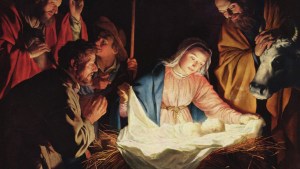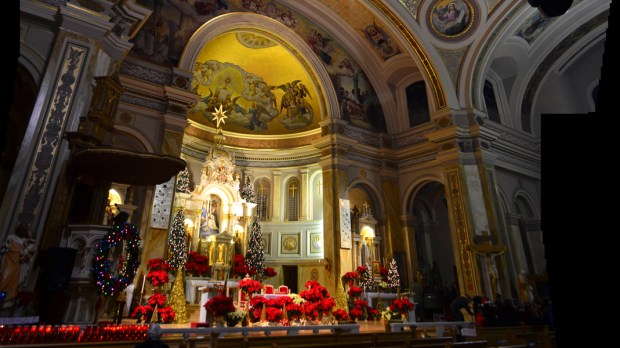Maybe you’re like me. Maybe you tend to be utterly enchanted by Christmas but a little routine about Mass.
And maybe you’re a little too superficial about Christmas and a little too intellectual in your appreciation of the Mass.
You can solve both problems at one time — adding more heart to your Mass and more brainpower to your Christmas — by considering how alike the two events are.
It is right there in the name Bethlehem, which in Hebrew means “House of Bread.”
The birth of Christ in the “House of Bread” led the way to the transformation of bread in the House of Christ. The simple coming of Christ as an infant to the Holy Family led to the simple coming of Christ in the Host to your family.
“These two mysteries are really one,” said Father John Hardon. “The Eucharist is merely an extension, a continuation, of what happened 2,000 years ago in Bethlehem.”
After all, both Christmas and Mass start with an Advent.
The Christmas celebration starts with the four-week penitential season of Advent, where we should prepare our hearts with special prayer, fasting, and almsgiving. It’s the same with Mass.
The obligatory hourlong fast before Communion is just part of it. It is also important to “recollect yourself” before Mass, like Mary and Joseph preparing for the coming of Christ.
We gather around the altar like travelers gathering in the City of David.
We all have our reasons for being at Mass. Some feel compelled, like those forced to go to Bethlehem for the census. Some feel called, like the shepherds. Others are following a deep desire they hardly understand, like the Magi.
We can think of our fellow Massgoers (and ourselves!) the same way as we gather in the church for Mass.
As the Mass begins, we hear why Jesus came, and we repeat the angels’ reaction to his coming.
“You were sent to heal the contrite of heart: Lord, have mercy,” prays the priest, setting the stage.
“Glory to God in the highest, and on earth peace to people of good will,” we proclaim, in song.
The Liturgy of the Word is a celebration of the Word who was made flesh.
In the great Christmas Gospel of St. John the Evangelist, we hear:
In the beginning was the Word … And the Word became flesh and made his dwelling among us.
The project of our Christian life is to be incorporated into the Body of Christ such that God’s will would be done in our lives as it is in heaven.
This is why we have readings in Mass: that the Word of God will become flesh again, in us.
After the Creed retells the Christmas story, the Liturgy of the Eucharist begins.
The Liturgy of the Eucharist is above all a “window” through which we are present at the one sacrifice Jesus Christ made for us all in his Passion and Death.
But the Catechism speaks of the whole “mystery of Christ, his Incarnation and Passover, which we celebrate in the Eucharist.” The liturgy reminds us of this in the offertory prayer to Jesus, who was “incarnate by the Holy Spirit and born of the Virgin.”
St. Faustina had visions of the infant Christ Child on the altar during Mass. Imagining what she saw may help to greet the savior as she did:
As Holy Mass began, I immediately felt a great interior recollection; joy filled my soul. During the offertory, I saw Jesus on the altar, incomparably beautiful. The whole time the Infant kept looking at everyone, stretching out his little hands (Diary, 347).
When we receive Communion, we experience Christmas in our soul.
Many saints have called the Mass a “daily Bethlehem.” Father John Hardon beautifully meditated on how the host is like the Christ child.
“Is there anything more simple than a child, or anything more simple than the round wafer of the Eucharist?” he asked. Babies “are speechless, helpless; they must be fed and carried from place to place. And is there anything more unpretentious than what seems to be a piece of bread and a sip of wine? Yet as we know, real humility is always greatness hiding itself out of love.”
Be conscious as you receive Communion that you are receiving the highest form of greatness: The greatness of total humility.
As St. John Paul II put it, when we say “Amen” before receiving Communion, we are echoing the Fiat of Mary that made Christmas possible.
So, this year, celebrate Christmas around your tree, and then celebrate it again at every Mass.
One is just as deep and delightful as the other.

Read more:
A Beautiful Christmas poem by St. John of the Cross

